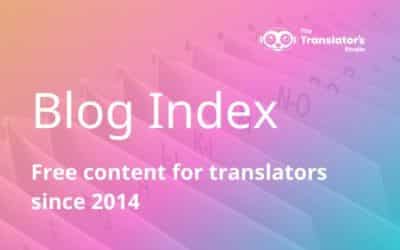You have important documents that you need translated. You are looking for professional translation services online because you must get these texts right. But, there are so many different options. How can you make sure you choose the right translation provider?
Here are some of the most common mistakes people make when they buy translations online. And how to avoid them.
MISTAKE 1. Not choosing a professional
How can you tell if you’re getting an online professional translation service? How do you know who you’re dealing with?
There are simple ways to check this. Make sure that the vendor has a consistent online presence. Look for a well-written website, with client testimonials. Check sites such as LinkedIn. Is the translation provider connected to other professionals? Are they members of professional organisations, like the MET or the Chartered Institute of Linguists? Do they write a blog? Is the blog a good source of information about their specialisations? This is easy information to find out. It’ll give you a good idea of who you are dealing with and whether they are serious professionals.
Want more information about how to find a translator? There is a whole section about it in this article by Gwen about how to get a translation.
It’s also worth asking questions about quality control. That way you can make sure the person you’re going to work with will be careful with your text. Ask if the professional translation services you are buying include proofreading. Ask what other quality control systems the translator uses.
Quality control in professional translation services online
Depending on the type of text, a translation and proofreading package might be a good idea. It means a second professional checks the final product. We’d always recommend proofreading if your text is for publication. There are different services available for different types of projects. For instance, when Gwen and I work as a team, we combine our different specialist fields. This means we can help you with all sorts of projects. We can organise translation, proofreading, transcreation and copywriting. So, you don’t have to worry.
Professional translators have university-level qualifications, like the CIoL post-graduate diploma in translation.
Check that your translator is qualified for the job. This should be part of your research into professional translation services online. A professional translator will have studied translation, languages and different specialist subjects.
Do you need a text that sells?
Do you have trouble creating certain texts, like marketing copy? Use a translator that can provide copywriting or transcreation. Not every translator offering professional translation services online has the skills to do this.
Give the translator a well-written text to get the most out of your professional translation services online.
MISTAKE 2. Not giving the translator enough information
Before you start looking for professional translation services online, think about your document. That way, you can give your translator the right information.
What is it for and who is your target reader? Think about the style and formality of the document. What do you want to use it for? Do you want it to sell or make people laugh? It is informative, literary or legally binding? A professional translator will ask questions like these when they give you their quotation.
Does your original text need professional editing? If it is clunky, it makes the translator’s job harder. Does your text need desktop publishing? Are there images or tables that need editing? At The Translator’s Studio, we talk to our clients about their projects and what they need.
MISTAKE 3. Not providing the documents in Word (if possible)
Buying professional translation services online? It’ll be cheaper if your documents are in Word. Why? Because otherwise it’s more work for the translator. The text might need to be extracted from a PDF, which can create hours of work (see this article about PDF translation pricing). Formats or layouts may need work in InDesign. All this slows the process and can mean extra costs for you. Providing the text in Word ensures a cheaper quote.
Make sure the person you’re going to work with will be careful with your text.
MISTAKE 4. Not being organised
Professional translation services work best when the translation project is well organised. Before sending your documents for translation, make sure you take the following steps:
- Check your original document before you send it to the translator. A general text you’ve used before won’t drive those sales you want. Write for your target market. Give your text focus. You’ll save money because you’re not translating unnecessary text.
- Make sure the document you send for translation is the final version. Once the translator starts work, changes will cost extra.
- Be available. A professional translator may well have questions about your text. Answering translation queries quickly will make the process smoother and faster.
The translator has only your source text to work with. If your text is poor quality, it makes the translator’s job more difficult. Make sure there are no spelling mistakes, clumsy phrasing or other mistakes in your document. That makes the translator slower and increases your costs. Give the translator a well-written text to get the most out of your professional translation services online.
MISTAKE 5. Not using a specialist
There are many different types of professional translation services online. You need to find a translator who is not only professional, but can deal with your specific document. This is someone who offers professional translation services for your industry. If your online translation service is professional, then the translator will handle each text and industry differently. There are marketing translators (like us), legal translators, scientific translators, patent translators, medical translators and literary translators. If you want good results, you need a professional translator who specialises in your field.
If you remember just one word of caution from this article:
The Internet is a jungle. Be wary of professional translation services online that seem too cheap to be true. They probably are. A professional translator will not be charging rock bottom rates. They won’t claim to be able to translate any type of text, or do it instantly. Very low prices and other non-credible claims are just that. False economy will cost you much more in the long run.
Don’t miss out on our translator newsletter!
News from us and about the translation industry including our popular monthly quiz. Sign up in the sidebar.





Hm. Not sure I’d agree that “Professional translators have university-level qualifications, like the CIoL post-graduate diploma in translation”. I’m definitely a professional translator in both my approach and output – and yet my university-level qualifications are in archaeology, which of course allows me to offer that subject as one of my specialisations.
I do intend – one of these years – to find the time to take the DipTrans at some point, when I’m not quite so busy producing professional translations!
Hi Jane, thanks for reading and commenting on Lucy’s article. I think the ideal situation for a professional translator is to be qualified in translation and at least one specialisation. Or, to gain extensive experience in the area where they aren’t qualified, and do CPD, as in your case. Just studying language and translation makes it difficult to establish a specialisation. That was my problem when I first started, which I talk about in this post. If the translator has a degree in a completely different area, like archaeology, then they have their unique selling point, which can help them get work. That said, someone starting out as a translator without studying translation, editing and proofreading suggests they think that these are skills that come naturally to them; that they can just do them at a professional level. That is a myth. It’s the same attitude as the one that makes end clients think their office workers can do their translations as well as a professional.
Hi Jane. Thanks for taking the time to read and comment on the blog. I started working as a translator without having a professional qualification and although I got work, I could see that being accredited would give me more advantages in a crowded marketplace. I wrote about my reasons for taking the exam (and why I decided against a master’s in translation) here: https://nikkigrahamtranix.com/2017/04/03/the-diploma-in-translation-what-is-it-why-do-i-want-it/ It was a way to improve the quality of my work and provide clients with a degree of security. My university degree and previous work experience didn’t lend themselves particularly to specialisation, so the lack of an obvious specialty field was another driving force for me.